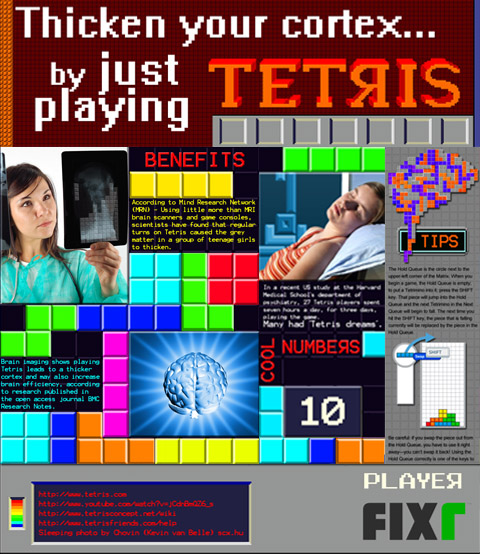Tetris is a hugely popular tile matching video game created in Moscow in 1984.
Now psychologists at Plymouth University say the visual stimulation provided by the game could reduce naturally occurring cravings for long enough to ward them off.
 Researchers
had used visual games to interrupt cravings before, but only when they
had induced those cravings first, said Jackie Andrade, a psychology professor at Plymouth University's Cognition Institute in the U.K. For this study, people's
cravings happened - or did not happen - naturally. "Naturally
occurring cravings might be harder to disrupt because they are triggered
by internal states like hunger," Andrade said. "We chose Tetris because
we wanted a task that would be interesting, demanding and highly
visual."
Researchers
had used visual games to interrupt cravings before, but only when they
had induced those cravings first, said Jackie Andrade, a psychology professor at Plymouth University's Cognition Institute in the U.K. For this study, people's
cravings happened - or did not happen - naturally. "Naturally
occurring cravings might be harder to disrupt because they are triggered
by internal states like hunger," Andrade said. "We chose Tetris because
we wanted a task that would be interesting, demanding and highly
visual."The study
She
and her team had 119 college-aged, primarily female, students describe
what, if anything, they were craving, and how badly. Then they
instructed the students to play Tetris for three minutes. For
half of the students, selected at random, the game worked fine. For the
other half, only a load screen and error message displayed and they
could not play. Then all of the students filled out the craving questionnaire again. Two
thirds of them reported craving something at the beginning of the test:
58 wanted food or a drink, 10 wanted caffeine, and 12 wanted nicotine.
The remaining 39 didn't crave anything initially.
Cravings
got weaker over time for everyone. But they weakened faster and to a
greater extent among participants who played Tetris, the authors wrote
in the journal Appetite. For instance, one tool they used measured craving strength on a scale
from 1 to 100. Among people who reported initially craving something,
the strength of those cravings fell from 59 to 45 for Tetris players, on
average, and from 58 to 55 in the comparison group.
Why Tetris
The reason for the lower cravings, said researchers, is that Tetris is a fast-moving visual game that requires
attention to shapes and positions. That distracts the part of the brain
that produces imagery of the thing you crave and therefore makes it
harder to crave. It's an aspect of the game that anyone can test. "Next time you play Tetris, try to visualize a friend's face," said Andrade. "It's not easy to do without your game suffering."Professor Andrade said the research tested elaborated intrusion (EI) theory, which dictates that imagery is central to craving and a visual task should therefore decrease it. "Feeling in control is an important part of staying motivated, and playing Tetris can potentially help the individual to stay in control when cravings strike," Professor Andrade said.
"It is something a person can quickly access for the most part whether they are at work or at home, and replaces the feeling of stress caused by the craving itself. Ultimately, we are constantly looking for ways to stimulate cravings for healthy activities, such as exercise, but this is a neutral activity that we have shown can have a positive impact."
The psychology of cravings
Craving interferes with other tasks -- it grabs our attention, and our ability to think about other things at the same time. This is because we have a limited capacity in our brains to hold things in attention and work on them. Thinking about a pyramid, for example, and rolling it around in imaginary space requires us to hold the shape in our attention and work on how it would look as it moves.
What this and some other recent studies do, is flip this around. If craving interferes with other tasks, what about using other tasks to interfere with craving? And if craving is linked to imagery, what about using another task that requires similar limited cognitive space -- like this game?
Bottom line
The game also has another quality that makes it particularly useful in distracting cravers, said Andrade: it's fun. That makes it far more likely to be used than trying to play with an imaginary pyramid in your mind's eye.
Any visual or multisensory activity might have the same effect as Tetris, Andrade said. She found in an earlier study that making shapes out of plastic led to a similar outcome. But the researchers did not measure how long the reduction in cravings lasted, and it might not be very long, she said. However, people trying to lose weight could try incorporating Tetris into their lives, Andrade said. It is important that people are motivated to play the game for it to be an effective tool to fight cravings. And as a positive side effect you may actually become a very skillful player!

Via: Fixr
Sources: http://medicalxpress.com/, http://www.medicaldaily.com/, http://www.theguardian.com/, http://news.discovery.com/, http://www.solarnews.ph/

